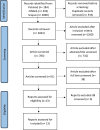Interventions to Improve Sexual and Reproductive Health Related Knowledge and Attitudes Among the Adolescents: Scoping Review
- PMID: 39811460
- PMCID: PMC11730756
- DOI: 10.2147/RMHP.S490395
Interventions to Improve Sexual and Reproductive Health Related Knowledge and Attitudes Among the Adolescents: Scoping Review
Abstract
Many interventions have been studied to improve sexual and reproductive health (SRH) knowledge and attitudes. These interventions aim to prevent adolescents from the risk of sexually transmitted infections (STIs), unwanted pregnancy, and abortion. The lack of comprehensive sex education contributes to adolescents' limited understanding of SRH. This study aims to describe reproductive health educational interventions aimed at preventing the RH triad (STIs, unintended pregnancies, and abortions) in adolescents. This study employed a scoping review method. Articles were searched from three databases: CINAHL, PubMed, and Scopus. The keywords used were: reproductive health, sex education, adolescent, knowledge, behavior, intervention. Inclusion criteria included quantitative intervention research, quasi-experimental, or randomized controlled trials; involving adolescents aged 10-19 years; describing at least one intervention to improve knowledge, attitudes, or awareness about reproductive health; and published in English or Indonesian between 2019-2024. Data were manually extracted and analyzed descriptively using qualitative methods. Based on the search results, 13 articles were identified that discussed interventions to improve adolescents' knowledge and attitudes towards reproductive health. The types of interventions included smartphone-based, school-based, game-based, educational, and family-based interventions. The duration of interventions varied from a few sessions to several months. Activities included watching videos, accessing educational materials through apps, participating in discussions and demonstrations at school, playing educational games, and engaging in interactive family sessions. These interventions generally aim to enhance adolescents' knowledge and attitudes towards reproductive health through various methods and durations. Further studies are needed to explore and develop more comprehensive and contextual interventions for diverse adolescent groups.
Keywords: adolescents; attitude; intervention; knowledge; reproductive health.
© 2025 Putri et al.
Conflict of interest statement
The authors declare no conflicts of interest in this study.
References
-
- Statistics Indonesia Total Population by Age Group and Sex, INDONESIA, Year 2022. 2022. https://sensus.bps.go.id/topik/tabular/sp2022/193/1/0 Accessed 06 January 2024.
-
- BKKBN-National Population and Family Planning Board BSIM of HKKRI& II. Indonesian Demographic and Health Survey 2017: Adolescents Reproductive Health. 2017.
-
- National Population and Family Planning Board (BKKBN). 2023https://kampungkb.bkkbn.go.id/ Accessed 06 January 2024.
-
- Ministry of Health, Republic of Indonesia Adolescent Reproductive Health: Problems and Preventive Measures. 2022. https://yankes.kemkes.go.id/view_artikel/29/kesehatan-reproduksi-remaja-... Accessed 06 January 2024.
Publication types
LinkOut - more resources
Full Text Sources


